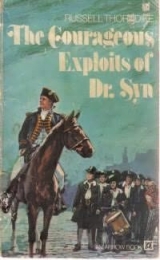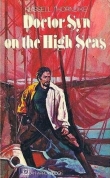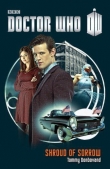
Текст книги "The COURAGEOUS EXPLOITS OF DOCTOR SYN "
Автор книги: Russell Thorndike
Жанр:
Исторические приключения
сообщить о нарушении
Текущая страница: 15 (всего у книги 16 страниц)
that a crunched piece of paper was clutched in his hand. Although he could distinguish it as paper, it was too dark to
examine it, to be one of the ribs of the ship, he raised himself slowly, fearful of striking his aching head against the
deck above. Remembering tales of other men who had suffered at the hands of the Press Gang, but had escaped, he
conjectured that he must be in the bilge, which was the common prison for victims previous to leaving harbour.
But he soon realized that the floor beneath him was not sloped like the bottom of a ship. Also it was not wood
but earth at that. He eventually stood upright, and stretching up his arms could feel nothing above him. He began to
edge his way along the side, and felt that the wood had given place to brick. And then, s his eyes became
accustomed to the darkness, he made out that he was not confined at all, but was in the open air, and at last the
building close to him resolved itself into the ‘Red Lion’.
His thankfulness at this discovery knew no bounds, which compensated him for his throbbing head and aching
limbs. He realized that he must have lain beneath Polly’s window for a long time, for the inn was shut and quiet,
and so with a gesture of good-night towards Polly’s darkened casement, he made the best of his way back to his
lodgings, taking every precaution to listen at every corner, so that he would not be surprised again. He could not
imagine why he had been knocked out by the Press Gang, and then left for dead. Why had they not shipped him
abroad after attacking him? Had he been rescued by some good Samaritans who bore a hatred for the Press Gang
methods? There wee many such fellows in Hythe he well knew. But then, why had they left him after the rescue?
Had they in run been captured, and he forgotten in the darkness?
He made up his mind that he would tell Polly everything the next day, and he realized on reaching his lodgings
that this course would be necessary, since not only the blow on his skull, but the bruises on his face, where he fell,
would demand an explanation. It was not till after he had washed his wounds that he remembered the piece of paper
which he had put into his pocket. He smoothed it out and read by the light of his candle, Death to all spies by orders
of… And instead of a signature was the crude sketch of a scarecrow.
He had known others who had been warned in a similar fashion, and they had disappeared from the Marsh, and
were never heard of again. The very next day he told Polly everything, under a pledge of silence. She took a very
serious view of it, and made him promise to hold no further communication with Doctor Syn or the Captain, in case
he was further suspected by the mysterious Nightriders, who had spies everywhere.
Strong as he was, the nasty crack on his head made him very ill. He became feverish, and Polly gave up her
work at the ‘Red Lion’, so that she could nurse him at her parents’ house in Dymchurch, promising to marry him as
soon as he recovered. Her family liked him, and were more that satisfied that he would make Polly a good husband,
now that he was a master cooper. They all agreed to keep his presence in Dymchurch a secret, and to that end one
of Polly’s brothers drove them from Hythe in their fish-cart after dark. So, in a few days George Lee began to think
that his misfortune had been a blessing in disguise, and he made full use of his happiness in having his future bride
for his name.
14
THE CAPTAIN SITS UP LATE
The news of the assault upon George Lee was brought to Mipps in the coffin Shop by the very man who had
committed it. When he had finished describing the incident, which in his version spared no praise for himself, he
told the Sexton that in his opinion the Scarecrow ought to be most grateful for his initiative.
“And what’s more, Mister Sexton,” he went on, “you must see to it that the scarecrow is told the full facts at
once, so that he will not be caught out with that cargo of bones. He’ll find some means of stopping it, I’ll be bound,
‘cos he’s clever, just like what he’ll say I be, when you tells him the true facts same as I’ve told you.”
Mipps replied that the Scarecrow could always be trusted to thwart the Revenue men, and although he must
himself decline to discuss this matter, which was the Scarecrow’s business, he would promised that their mysterious
leader would receive the information.
Directly the man had gone, Mipps sought out Doctor Syn and told him what he had heard, adding: “And no
doubt, sir, this rascal is expecting a good reward for his zeal. What do we do?”
“Tell Percy to carry the two aces of clubs in his buckets this very evening, so that the Nightriders may meet at
the Oast House tonight. Pass the word for an hour after midnight, Mipps.”
“Aye, aye, sir,” replied Mipps.
“I have always objected to any member acting violently without my express orders,” went on the Vicar. “For
that type of man becomes a menace to us all. And what is more that man must be punished.”
“Death?” inquired Mipps with relish. “Well, I ain’t sorry. Never took to him myself, I didn’t.”
“I am not at all sure that I should not bring in the same ruling against those like you, Mipps, who think violently
without orders,” replied Doctor Syn.
“Very well, sir. Sorry,” replied Mipps promptly. He looked like a saint receiving a halo, which amused the
Vicar, who promptly poured him out a drink with a sorry shake of his head. Then he smiled genially and added,
“What a comical old rascal you are, Mipps,” and his tone had a note of real affection, “I believe no one delights in
violence so much as you.”
“I drinks your very good health, Vicar,” returned the Sexton, with a grin. “I think we have both had our moments
of violence on certain occasions that must be nameless.”
Percy wa s duly sent out with the summons to attend at the Oast House. Everyone concerned noted the sign of
two aces of clubs that floated in his water-buckets.
That night the Captain sat long over his drinks, and was more chatty than usual. As the clock struck midnight he
still showed no signs of wishing to turn in, though the Vicar made a gallant show of suppressing his yawns that he
was far from feeling. He presented a brave show of the polite host. In reality the Vicar was very anxious for the
Captain to bid him good-night, in order that he might safely fasten his door from the outside against any possible
exodus upon the Marsh. He had no wish for the Captain to take it into his head that an investigation outside the
house might put a stop to some activity on the part of the Scarecrow’s men.
Whether the Captain suspected that some such thing was planned for the night, the Vicar could not rightly
determine.
To ask him deliberately to turn in would be to arouse unnecessary suspicion in his guest’s mind, and yet to turn in
himself, asking the Captain to turn out the lamp, and extinguish the candles, in no way suited his plan.
As a matter of fact, no sooner did the grandfather clock in the hall strike midnight than the Captain proposed this
himself. He said pleasantly: “I see that you are most politely stifling your yawns, my good Parson. Now I happen
to be finding this book most diverting, and as I never make a rule of reading in bed, which I take to be a most
damnably dangerous practice so near the bedclothes, I should like to stay up and read a little further, if you have no
objection?”
Doctor Syn bent down and glanced at the back of the volume which the Captain was reading. He then looked up
at the space in the bookshelf, as though to verify the name of the volume. “Lawrence Sterne’s Tristram Shandy, eh
Captain?” he queried. “Well now, as a tutor I have ever had a quick eye for the student. I could always tell when
some young student at the University was really reading or out making a pretence at it, and I rather think that I have
caught you out this night. I can tell you that Sterne would be very disappointed at the desultory attention you have
bestowed upon his pages. I rather think that it is just that you have no desire to go to bed. Perhaps you wish for
another drink, eh?”
The Captain laughed. “You mean that half the time I have been reading I have been chatting about matters that
have nothing to do with the opinions of Shandy, eh? Well, in a sense you may be right. If so it is small compliment
to the author, eh? On the other hand, I should like to point out that our author has gripped me in spite of my
inclinations and I should certainly like to finish this passage of Corporal Trim’s account of the sick lieutenant.”
The Vicar nodded with appreciation. “Well, I confess to being a little sleepy myself, but I will further encourage
Morpheus to give me a sound night by fetching another bottle of brandy from the cellar. Any excuse is better than
none, eh? If you will excuse me but for a minute we will both be at an advantage.”
The suggestion pleased the Captain, since it meant detaining the Doctor a little longer before retiring. At least so
thought the vicar, as with candle in hand he crossed the hall and entered the servants’ quarters. Here he found
Mipps anxiously awaiting him, sitting in the dark close to the rum cask, and with a handy pannikin clasped tightly in
his fingers.
Doctor Syn smiled, and laid a warning finger to his lips. He then whispere d: “The Captain is for sitting up,
damn him. He is, in fact, pretending to read. His manner the whole evening has aroused my suspicions, and yet it is
time that we started for Mother Handaway’s. I am taking in another bottle of brandy to encourage his sleepiness that
shows as yet no signs of appearing. Give me but ten minutes or so, and then come round to the front door quietly
and knock violently. I will admit you, and you can say in a loud voice that poor old Fletcher is dying, which I think
will be no lie since Pepper told me this evening that his patient cannot be expected to last much longer. In fact, I
will call upon alibi in case the Captain makes some awkward inquiries. Indeed we will set out that way, and then
make a detour across the Marsh to the stables. It is necessary that we are at the Oast House by one o’clock>”
As he whispered Doctor Syn had been selecting the bottle of brandy from his bin. He then repeated his
instructions. “Ten minutes’ time, Mipps,” and went back to the library with candle and bottle. On his return he
found the Captain pretending very well to be engrossed with his book, though on his host’s entrance he sprang up
and insisted upon drawing the cork for his host.
“Now I am just going to have one glass, and one lass only,” said the vicar, “and then go straight up to bed. If I
took more I might have to ask your assistance and disturb your reading, which I should be loath to do. I would
sooner leave you to finish both the bottle and the book.”
“I am a slow reader, Parson,” said the Captain, “and I could finish more of your excellent brandy than the
excellent reading set out upon your shelves. But in my own defense I must boast that I do remember what I read,
and that is a thing that all students cannot say.”
“Sow, but very sure, eh?” nodded the Vicar. “Well, let us hope that such a method enables you to catch our
Scarecrow.”
“Ah yes, indeed,” replied the Captain sincerely.
For a few minutes Doctor Syn made a show of tidying up his table of papers which he had been poring over.
Parochial papers, of course. He then replaced certain volumes from the table to their allotted shelves. He also took
some appreciative sips from his glass of brandy.
He then bade the Captain a good-night, and was just opening the door when there came a violent knocking from
the hall.
“Now who on earth can that be at such a time?” he asked, showing a deal of disappointment. “Are you expecting
a midnight report from that excellent Bos’n of yours?”
The Captain shook his head. “No, sir. I should be very disgruntled if he came to fetch me out now upon the
Scarecrow’s business. It would have to be a very important circumstance that would persuade me out at such an
hour. No, Parson, I hate to depress you, but I rather fancy that this is a summons for the cure of souls.”
“I must confess that I fear so, too,” said Syn sadly. “There are of course plenty of sick folk upon the Marsh, but
only one that I know of who is in danger of passing, and that is p oor old Fletcher, whom I think I told you about
during supper.”
“Ah yes, indeed,” replied the Captain. “Eighty-nine, isn’t he? Well, perhaps it is his happy release knocking
upon your door.”
“Good gracious,” exclaimed the Vicar, as a further pounding sounded upon the front door, “here I stand
conjecturing when by opening the door I can find out the worst. How very stupid once becomes upon occasions.”
“I should never accuse you of stupidity,” said the Captain.
“But if I let that knocking continue, I shall be very stupid, for my old housekeeper will be aroused, and then we
shall both suffer for it tomorrow with bad cooking.” Saying which the Vicar went out of the library, crossed the hall
and opened the door.
“Oh, it’s Mister Mipps, is it?” he said in a loud voice. “Well, I presume I am right in my guess. Is it Fletcher?”
“It be,” replied the Mipps promptly.
“Gone?” inquired the Vicar with a tone of anxiety.
“No, but just a-goin’,” replied the Sexton.
“Dear, dear,” exclaimed the Vicar. “Have you been over there?”
“No, sir, but young Jim was coming round to fetch you, but seeing as how I had my light on in the shop, since I
was getting his old grand-dad’s coffin ready just in case, I sends him back so as to be in at the death, which he
wouldn’t want to miss, being such a very dutiful grandson, sir.”
“Come along in then, Mipps,” ordered the Vicar, “and while I get ready you can take a glass of something to
keep out the Marsh agues.” So saying he led the Sexton into the library.
As Doctor Syn poured out a glass of brandy for the Sexton he told the Captain that his guess was correct and that
it was indeed old Fletcher who was passing away, adding that he must set out immediately.
“I can’t offer to go for you,” laughed the Captain, “though I should welcome the chance of such courtesy to my
good host. But I know that my uniform would scare the poor old fellow into his grave the quicker. I presume,
however that he is too old to be one of the Scarecrow’s active followers?”
Doctor Syn allowed himself to look pained at the joke. “Fletcher has ever been a very good parishioner. He will
be sadly missed from his seat in church. His family occupies a whole pew, and has done ever since I have been in
charge here. Is Doctor Pepper with him, my good Mipps?”
“No, sir, he ain’t, and more shame to the old curmudgeon, I says,” replied the Sexton. “Young Jim called around
there before coming to me, and old Pepper said as how there was nothing he could do, so it was useless to turn out.
Jim told him too as how it was the end, seeing that the old boy keeps on asinging a funeral hymn at the top of his
voice which he says sounds very rattley.”
“Their place is something of a distance too,” went on the Vicar, “and it is essential that I get there in time for the
end. I think you had best saddle up the pony if you will, Mipps.”
“Certainly, sir, and then we can start at once.”
“No, there’s no need for you to accompany me, Mipps,” said the Vi car.
“As to that, sir, I beg leave to disagree,” replied the Sexton. “This hour of the morning ain’t very healthy upon
the Marsh. What with mists and agues that rise with ‘em, to say nothing of the bad characters that roams about at
such hours. In fact, sir, I’ve come on old Lightning, and bought my loaded blunderbuss.”
“To take a pot at the March agues or at the bad characters, eh?” laughed the Vicar.
“Whatever presents itself first, sir.” Replied the Sexton seriously. “There’s them sailors, too, of the Captain’s. I
hear tell that they gets very nervous when on night-guards, and that they flourishes cutlasses at you, however
innocent. Well, there’s nothing like a blunderbuss for stopping that sort of behaviour. So I’ll come with you, if you
please, sir. Besides, I can’t very well disappoint the old Lightning after having saddled him up. He’ll want a
canter.”
“You meant that old donkey?” laughed the Captain. “Does it ever canter?”
“Does it? Why should it be called Lightning then?” responded the disgusted Sexton.
“Well, then, we’ll get along together,” said the Vicar. “I’ll be glad of your company and you can look after the
animals while I am in the cottage. Hurry then, Mipps.”
In a few minutes the pony and donkey were carrying their masters along the Marsh road. The Captain watched
them from the front door, and listened to the noise of the hoofs when there was nothing to be seen but the wreaths of
mist into which the riders had disappeared.
“As queer a pair as ever I clapped my eyes on.” He said to himself. “A couple of characters whatever they may
be. And what, are they? Well, they could be simpletons. On the other hand, they could be as deep as the Indian
Ocean. Now how can we determine just what they are? It seems that here is an opportunity. They may be thinking
that I don’t know the whereabouts of the cottage where old Fletcher is dying. But I do. In fact, I have the Marsh
very well charted in my mind. But I am not at all sure whether old Fletcher is dying. Neither am I sure whether that
queer pair are really bound to visit him. The Vicar seemed more than anxious to get me to bed. Was he anxious to
get me safely into my room so that he could go out upon the Marsh without my knowing it?
“The more I think of it, the more it seems possible. Was that why he went to the cellar for that bottle of brandy?
We had already had sufficient, both of us. There was no necessity to open another. Now was that but an excuse to
join his Sexton at the back of the house, so that he could send him to the front with the message about Fletcher?
Suppose now that they have not gone to Fletcher’s. Suppose Fletcher is but an excuse for them to get out for some
meeting upon the Marsh. Suppose Doctor Syn’s animosity against the Scarecrow is just a deceit? Could that queer
brace of birds be in league with the Scarecrow? Could they be in his power? Could one of them be the Scarecrow?
Or are they hunting the Scarecrow themselves and want me out of it? Well, I can find out if Fletcher is an excuse by
going there myself, and taking a look round. If they are there the animals will be outside. If they are not there it
will tell me that they have gone elsewhere to some place which they don’t want me to locate. We’ll get this Fletcher
business cleared up anyway.”
Thus arguing with himself, the Captain fastened on his sword, put on his cloak and hat, and making sure that he
had the key of the front door in his pocket, closed the door after him and stepped out briskly towards the churchyard.
At the corner of the wall he halted and whistled.
This signal was immediately answered by an: “Aye, aye, sir. All’s well.”
“That, my good man, has yet to be determined,” replied the Captain to the sailor who had miraculously appeared
from the mist. “Indeed I am about to find out. Tell me now, what time did the Sexton enter the Vicarage? You
were watching the house, I trust?”
“Must have been about an hour ago, sir, that I first saw him come round from the Ship Inn,” replied the sailor. “I
followed him at a safe distance to the back of the house yonder. The old housekeeper was closing up for the night,
and instead of going straight to the back door to be admitted, the Sexton waits outside till all was dark and still.
Then he walks to the door and opens it. This puzzled me, sir, because I had distinctly heard the bolts shot-to. Did
the old girl shoot ‘em and then quietly open them up again? Or did someone else do it? Yet come to think of it
there ain’t no one living in the house but you and the Vicar beside the old lady.”
“And since I did not shoot the bolts,” said the Captain, “it only leaves Doctor Syn who could have done it, unless,
as you suggest, it was the housekeeper herself.”
“And another thing what puzzled me, sir,” went on the sailor, “I see a candle light appear at the back some half
and hour ago, but then it went. But a little after the Sexton, and he must have been sitting in the dark, comes out of
the back door and goes round to the front door where he knocks and knocks. Now why does he want to let himself
out of the back, I asks myself, in order that he can knock to get let in at the front? Seems to me”
“What does it seem to you?” rapped out the Captain.
“Why, sir, such as stealing of his drinks from the wine cellar, as it was the window of the wine cellar where I saw
the light.”
“There is no window to the wine cellar,” retorted the Captain. “But there is one in the still-room which leads to
it. There may be something in what you say. Step along to the barn now and tell the Bos’n to bring round my
horse.”
When the Captain drew rein near the cottage and handed over his horse to the Bos’n, who was in no good temper
after being awakened for this expedition and told to walk, which developed into a trot beside the Captain, the notes
of a man singing reached their ears. The Captain approached the cottage cautiously on foot, and without being seen
discovered that the singer was none other than the Sexton, who was regaling the night with a funeral hymn. One
window was lighted up, and by its reflection the Captain could see both the pony and donkey in charge of Mipps.
Any doubts he may have entertained as to whether Doctor Syn was in the cottage were dispelled when he heard the
Vicar’s rich voice reading from the Scriptures. Disappointed he had been mistaken in the Vicar the Captain rejoined
the Bos’n and went home to bed.
But he did not know that Mipps had sent Jimmie Bone the Highwayman to the Oast House with news that
important business had detained the Scarecrow, but that the Nightriders were to await his coming.
An hour later the Scarecrow gave judgement against the member who had assaulted George Lee. A heavy fine
was levied against him from his profits on the next run.
But if the Captain was disappointed at this failure, it was nothing to his rage when he was made the laughingstock of the district when he ordered the casks of bones to be emptied upon the quayside. But the laugh against him
was even greater that he thought, for the crew, enraged against his unwarranted suspicions, carried their coils of rope
to store under his nose, so that the full run of tobacco was safely landed and later distributed.
Against his own convictions, however, the Captain could not free himself of suspicion against the Vicar and his
Sexton, and he made a habit of sitting up every night reading till the Vicar himself had gone to bed.








